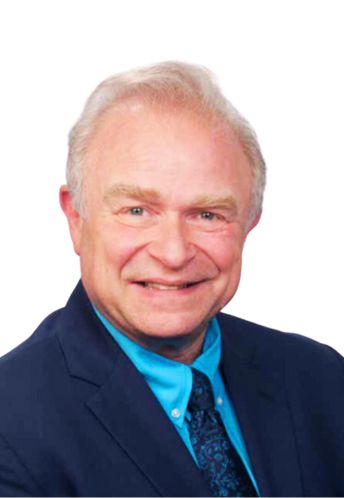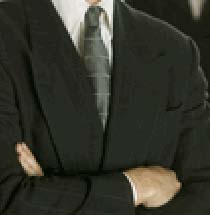








Marvin
H. Jeter, III, Ph.D.
A Personal Perspective
of Education
“I thought Marvin was smart enough to know
better.” These were the words of my grandfather, an educator, upon
hearing that I had chosen a career in education administration.
Indeed, I watched him, my grandmother-librarian, my mother and three
aunts - all teachers, holding a multitude of educational positions
over a lifetime. In my youthful wisdom, I was sure that this was not
for me, and I ran from my legacy as fast and as hard as possible.
However, after two years in pre-medical studies; after earning a
degree in radio, television and film; after owning and managing a
picture frame shop and floral design service for six years; and
after declining an offer to become a partner in an interior design
business in Beverly Hills, I finally chose to pursue the career that
was so obvious for my background.
Growing up with a grandfather who was
a school superintendent for more than twenty-five years in the same
district, as well as in two neighboring districts, I was keenly
aware of the trials of the office. Of course, the fact that as a
child I would rub the back of his bald head removed the mystic of
the job and made me realize that with all of the accolades, this CEO
was merely another human with another job. The fact that his
district that he had worked so hard to build was destroyed as a
testing ground for the civil rights war of the sixties and seventies
presented the reality that the job could tear out the heart of the
man and his family. The fact that he remained, until his death last
year, one of the most respected and reputed members of the community
enforced for me the nature of the job as a public servant
responsible for molding the lives of the students, the parents, and
the entire community. The reality of such pervasive responsibility
scared me away from the profession as a teen-ager and early adult.
My educational experiences gave me
some unique insight into some of the challenges that our children
face in school. As a first grade student from a family that valued
education, I was basically the teacher’s assistant being placed in
the hall each day to teach the lower performing students to read. My
teacher knew that I could catch up with the work that she was
teaching with my mother’s help and with very little effort. In the
second semester of second grade, I was moved to a private academy
with a group of peers who had been together since pre-K and had been
studying Spanish and other advanced coursework for the entire time.
To say that I was behind is a severe understatement, and I acted out
to avoid being the ‘stupid kid’ and was sent home every day until
the end of the year. I had no idea that the frustrations I felt were
preparing me for the empathy, patience, and understanding that would
be necessary to help students, teachers, and parents make
accommodations for all children to have opportunities for success.
It was the behavior modeled by my parents and grandparents as well
as the dedicated and capable teachers in elementary school that
helped me to catch up and to become one of the top students once
again. This same behavior in my daily activity has helped the
students and their parents with whom I have worked over the years.
Spending my middle and high school
years predominantly at a college preparatory school gave me an
excellent academic background in a broad range of the curriculum. By
the time I was moved in my senior year to Jenks, Oklahoma, I had
already taken Chemistry and Physics, Trigonometry and Pre-calculus,
two years of Latin, three years of advanced composition and
literature, and three years of history. Therefore, I became
completely submerged in extra-curricular activities. As drum major
of the band, officer for science club, choreographer for school
musicals, lab assistant for Chemistry, and so forth, I began to
further develop my leadership skills and to realize the strength
that accompanies facilitating as a team member rather than managing
by ultimatum.
Owning and managing my own business
offered a variety of challenges regarding budgets, management,
efficiency, and so forth. I had experienced many of these situations
as a retail manager during college, but when I became the owner and
the concept of the final ‘buck stops here’ found my door, I
developed a renewed sense of responsibility. For six years I was in
the driver’s seat and was forced to shoulder the blame for any
indiscretions or inadequacies in my business. This included
financial decisions as well as public relations decisions. I was the
person inevitably responsible for making every customer ‘happy’ –
even the ones who were determined not to be happy with anything.
Because of this experience, I feel a deeper sense of not only
accountability to students and parents, but also obligation to the
community - the taxpayers who foot the bill for our public education
system. I realized that every dollar counts and that with proper
management, one dollar can sometimes equal two or more. It merely
requires creative and responsible supervision.
At the encouragement of my dear wife, I decided to ‘try education’
as a substitute teacher. For the first week, I was assigned to an
elementary special education class, and I was ‘hooked’ immediately.
After substituting every day for a couple of weeks, I was assigned
to an elementary behaviorally challenged class that served sixteen
of the south-end elementary schools in the inter-city district of
Jackson, Mississippi. These students, kindergarten through fifth
grade, had been suspended or expelled for a minimum of twenty days
from their home schools. Needless to say, they were each a
challenge. I enjoyed the class so much and was able to facilitate
positive change in so many students, that I was hired for the
remainder of that year and for the next year and a half as the
instructor for this group. My class was called the Positive Action
Center. While there were some who disapproved of the fact that these
‘bad kids’ were receiving any form of positive reinforcement, the
board supported the program for a time and the students flourished.
It was increasingly evident during my
time in elementary that in order to really make a difference and to
have the freedom to really ‘serve’ children and their families, I
needed additional training. For this reason, I began graduate
education first in guidance and counseling, then in school
psychology and education administration. For about two years, I
pursued these ends while working in part-time capacities in several
districts, and I graduated with my two masters degrees on two
consecutive Saturdays. The simultaneous training offered a unique
perspective into the workings of the education – a service
profession. I developed a keen awareness that many of the arguments
in education were communication problems in nature – basically a
case of ‘the right hand not knowing what the left hand was doing.’
For this reason, I believe that it is largely the responsibility of
upper administration to facilitate interaction and professional
development opportunities for specialists not only in their own
areas of expertise, but also in more cross-training. Thereby, they
may have a greater appreciation for each other and the parameters of
each person’s responsibility. Both my Master of School Psychology
and my PhD cognate studies in guidance and counseling have offered
me a better understanding of the data-driven best practices for
supporting such a remedial program in schools.
During my ‘tour of duty’ as principal
of the school at Mississippi State Hospital I dealt primarily with
children and adolescents who were court-ordered to the facility for
assessment and evaluation. Repeatedly, I faced trials that grew out
of a lack of understanding and mutual respect for the various
departments as well as the professional and ethical obligations to
the patients. There is such an abundance of talent and intellect
that remains untapped because there are too few leaders dedicated to
teambuilding and to fostering a unified effort among the
stakeholders. Because of the ‘turf battles’ between medicine,
psychology, and education, patients’ success was often compromised.
In other words, disharmony in a service organization such as a
school is not only limiting to the success of the employees but also
detrimental to the well-being and success of the students. A leader
who is dedicated to opening the lines of communication and to
providing opportunities for all of the involved publics to taste
success and reinforcement creates a refreshing spirit of solidarity
that is contagious. With such leadership, education may flourish.
As curriculum coordinator at Velma
Jackson, I was part of one of the most extensive interdisciplinary
and multi-focused magnet programs in America. However, I experienced
the challenges that come from upper level administration who do not
share the same breadth of understanding regarding the connectedness
of the academic specialties. As an affiliate of the National Academy
Foundation whose mission is “to strengthen the preparedness of the
American workforce,” our program was dedicated to making
research-based decisions with a high probability of improving the
students’ basic skills while providing a global perspective and
enhancing their higher-order thinking skills. By hands-on active
learning in a format that provided a region specific application and
that is interdisciplinary in scope, students successfully absorbed
the information while building the skills to succeed in the
workforce or in post-secondary education. Some of the greatest
challenges came from those who did not understand the complexity and
therefore, were scared to allow the freedom necessary to fully
implement the design. Administrators must have a broad enough
understanding as well as the self-confidence to allow and to
encourage all members to grow and to achieve new heights.
As I have progressed through the
ranks of building, district, and state educational leadership, I
have learned much. Effective communication is one of the most
valuable tools available to educators, yet it is sadly one of the
most under-employed. When considering the challenge of leading an
organization, especially a school district, the buy-in of all
publics involved is paramount. Therefore, the same principles of
marketing one’s product apply to selling the stakeholders the
product of quality education. As in product development, formulating
a clear picture of the needs of the consumer is imperative. By
forming focus groups comprised of a diverse representation of needs,
data may be collected and compiled. At the same time, there is a
great opportunity for the dissemination of information as to program
position, program goals, and the challenges of aligning the two. As
representatives from all publics or stakeholder groups are allowed
to discuss basic concerns and to hear district-wide considerations,
they become ‘educated’ to the broad picture and aware that there are
many perspectives to be considered for any decision. In every
civilization, when communication has been facilitated between
special interest groups, a civil degree of mutual respect has soon
been achieved. This respect for others and their needs usually
allows people to be more aware and hopefully more sensitive to the
organizations responsibility to all members. The result is optimally
a spirit of teamwork that encourages players to be patient with
strategies which may not necessarily be their priorities. Instead,
they may accept these ideas as priorities of teammates in the game
to provide the best services to all members.
When one considers leadership style,
most frequently the challenge of balancing management with
supervision immediately comes to mind. Through my responsibilities
in retail, I learned firsthand the pitfalls of merely employing a
style of management as well as the benefits of supervision. I
believe that if we are in the business of molding lives for success
and prosperity, this behavior begins with the manner in which we
supervise employees of the organization. My style in the most basic
sense involves clear and consistent communication of expectations,
personal modeling of behaviors that are congruent with my
expectations for my team, consistent monitoring and positive
feedback, and assistance toward meeting the goals. I hold to the
thought that if our country is to recover from the current teacher
deficit, we must make every effort to save the teachers who
demonstrate potential. However, I believe that we owe it to the
taxpayers who subsidize us, the school employees who work hard to
perform well, and the students who will be our leaders of tomorrow,
to be consistent in leadership. This means the embodiment of a style
that will promote and support good job performance while being
strong enough to relieve the responsibility of those who do not
comply with efforts to improve. It has been my experience that such
a style fosters a strong work ethic among the majority and thereby,
successful outcomes for students.
It is my personal opinion that just
as the principal is the instructional leader of a building, the
superintendent is the instructional leader of the district. I think
that this is evident in examining the leading districts across our
country. The highest performing student populations usually are in
district with upper-level administrators that are aware and
dedicated to quality education and quality schools. All too often,
we are finding that administrators who do not fully understand the
connection of a strong program of curriculum and instruction paired
with consistent and correlated staff development are managing
districts that are sadly underachieving. In a time when there are a
multitude of extracurricular and supplementary obligations, we
cannot forget our primary responsibility. This responsibility is the
academic preparation of our students to become productive citizens
upon graduation whether in post-secondary education or in immediate
entry to the workforce. It seems that the streamlined training
programs of the past few years have produced many educators who may
be well versed and capable in their specialty area while extremely
limited often to the point of incompetence in other areas. Educators
must understand the importance of transitioning and connecting
learning from elementary to middle, then to secondary and finally to
post-secondary education and training. When a superintendent
possesses a full understanding of curriculum, a working knowledge of
the responsibilities of all areas of educational employment, and an
awareness of the importance of the developmental appropriateness of
strategies for all levels of service, there may be a higher level of
confidence. This leader will make informed decisions that are in the
best interest of building quality education for all of the students
served. Without such knowledge one cannot predict success because
the ship is basically sailing without a captain.
I often share that I have great
doubts as to whether the teachers I had in school were aware of the
information that I would need to know for success in today’s world.
In a time where knowledge is doubling at such a rapid pace, I know
that we do not know all that our children will need for success
tomorrow. In evaluating my education, I believe that the strength
came in the fact that my teachers consistently taught me and
challenged me to think, to communicate, and to be aware of how to
find the information that I needed. They also built for me a belief
system or confidence that I can learn and succeed in anything that I
choose. Public education must move away from the mass produced,
quick-fix, memorize and spit back methods of education that have
prevailed in recent years. We must develop classrooms that meet a
diversity of learning styles with a repertoire of instructional
strategies that promote higher-order thinking through constructive
response. This intellectual form of education must be paired with a
global awareness that will allow our children to compete in a more
connected international marketplace than we can imagine and to be
confident that they are as capable and qualified as any to succeed.
Their confidence must be reality-based to avoid the hostilities that
have come from social promotion and graduation of students who
realize too late that they are not prepared. If we do not rise to
the occasion and meet these new demands, I am concerned that public
education soon will be replaced with privatized programs.
While one of my strongest beliefs is
that not a single teacher in my background knew what I would need to
know to succeed in the twenty-first century, almost all of my
teachers contributed to building in me a high level of
self-confidence and to fostering skills of higher-order thinking.
When combined, these abilities will allow me to succeed in any
endeavor. As educators in a world that is doubling in information
every thirty minutes, we must build the same skills in our learners
of today so that they may succeed as the leaders of tomorrow. I
guess I would have to answer my grandfather by saying that “Indeed,
I was smart enough to know better,” but called to do none other than
to live the legacy of being a strong leader in education promoting
discipline, knowledge and children. In the simplest words of Whitney
Houston, “the children are our future,” and we must “teach them well
and let them lead the way” because they are our legacy.